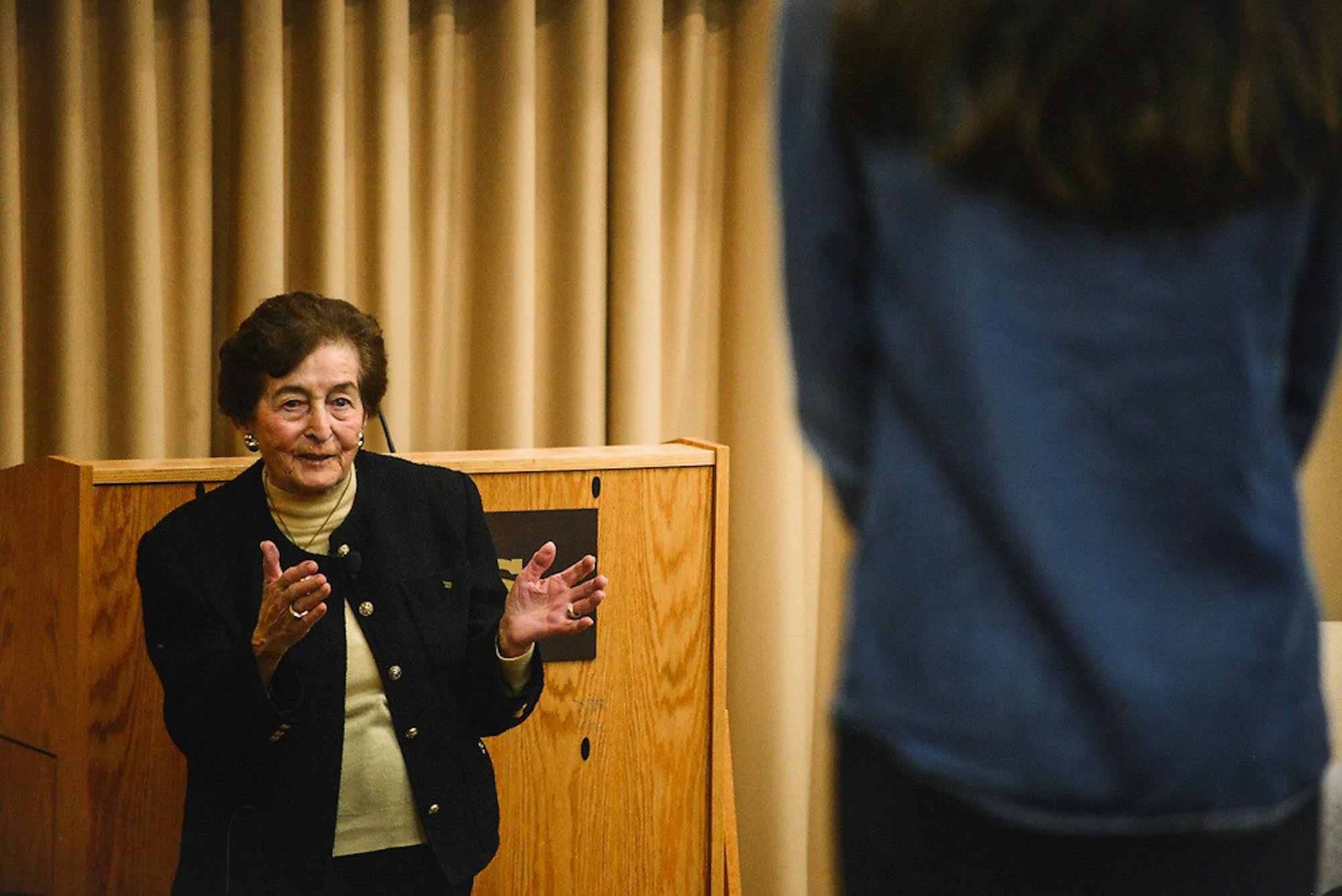Tufts Hillel hosted Judith Altmann, a Holocaust survivor and educator, as part of its Cummings/Hillel Program for Holocaust and Genocide Education last night for a lecture sharing her story of surviving disease, death marches and Auschwitz.
Altmann shared a number of heartbreaking stories, from witnessing the death of dozens of close family members to her eventual liberation by the British Army.
Altmann began her story by describing the rise of Hitler and eventual invasion of her home nation of Czechoslovakia.
“Week one [of Germany’s invasion of Czechoslovakia], us children couldn’t go to school. I met my friend Olga and she said 'Judy, why aren’t you going to school today?' 'Because I'm Jewish,'" she said. "Every Jew had to wear the Star of David, and it had to be sewn on our sleeve and on our backs.”
Altmann then shared how the violence under German occupation quickly escalated; she described saving food, milk and butter for other family members and hiring local peasants to deliver it.
“One day, the peasant came back and said, ‘I regret very much I could not deliver the food’ … but I witnessed her execution,” she said.
This was only the first story of Altmann losing a family member. After Altmann shared several other horrors she and her family underwent, she described her experience first arriving at a concentration camp, asking her captors where she had been taken.
“This is hell. There was a big sign [that read], 'Work will liberate you,'” she said.
Altmann described, soon after arriving at the camp, seeing Joseph Mengele, who was infamous for sending Jews at concentration camps to their deaths.
"He was called the Angel of Death. He earned that name," Altmann said.
"He pointed to me and my niece, he pointed to the left. The rest [of my family] marched on. My father put his hands on my head as he did every Friday night to bless us. He said ‘Judy, you will live.’"
Altmann said this was the last time she saw 24 members of her family.
"We went to the left, and they went to their deaths,” she said.
Altmann then shared her experiences in the camp, including the work she had to do dragging bodies from the camp's crematorium to mass graves and the horrible conditions and memories she had of death marches.
Altmann also spoke on her experience as the British Army rapidly approached, and eventually liberated, the camp.
“Hitler saw he was losing the war … he gave an order that ‘if you see anyone coming to liberate [Jews], you give every prisoner a poisoned piece of bread,'" she said. "[Hitler] wanted the British to find dead bodies … that’s all he wanted.”
Fortunately for the camps inhabitants, the Germans never had the time to distribute the poisoned bread, Altmann said. The British liberated the camp shortly after.
“On a beautiful morning we saw soldiers in a different uniform [say] ‘you are free,’” Altmann said.
Altmann ended her talk to a standing ovation by the full auditorium. She then took questions from the audience.
In one question, an audience member asked Altmann about the prevalence of people who deny the Holocaust ever happened — people that believe Altmann’s story is fabricated.
“Tell them what you heard today … tell them to seek out Holocaust survivors and ask them about their lives," she said. "Maybe you’ll be able to convince them and teach … that’s the only thing you can do — teach.”
George Behrakis, a junior who attended the event, told the Daily he was excited to hear that Altmann was this year’s keynote speaker. He noted how powerful Altmann’s story was.
“I was struck by how vivid her descriptions of these events were. I think it’s inspiring that she has devoted her life to speaking about this very difficult and tragic time and how she has persevered,” Behrakis said.
Josh Hochberg, a first-year who also attended the event, echoed Behrakis’ sentiment.
“What stuck out to me was her overall message on the importance of forgiveness … especially when how she returned [to the camps later in her life], she used it as an opportunity to empower and inspire others, rather than simply try to move on,” he said.
Judith Altmann delivers Hillel’s keynote address on Holocaust and genocide education

Mrs. Judith Altmann addresses the audience in ASEAN Auditorium as the speaker of the 2019 Keynote Address for the Cummings/Hillel Program for Holocaust and Genocide Education on March 5.





